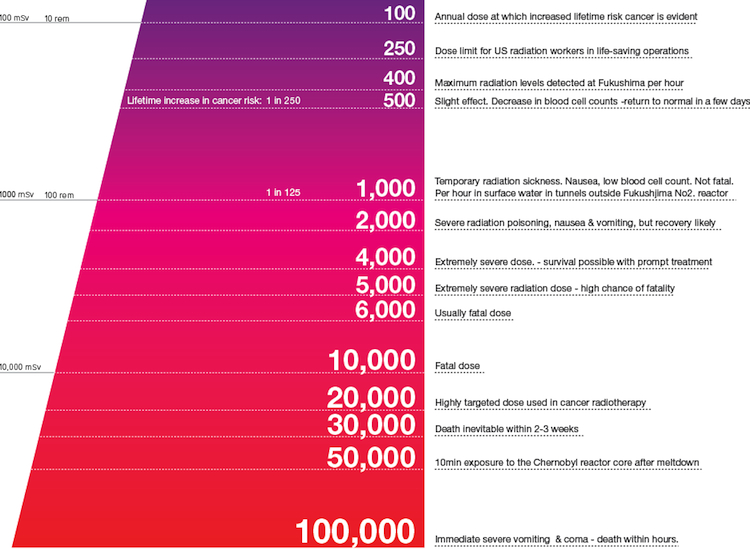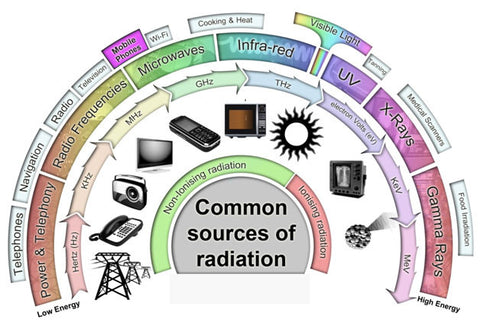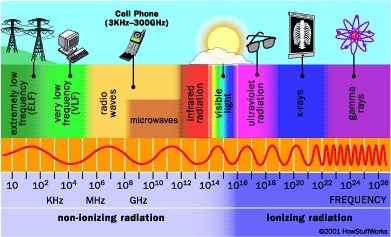New Mars Forums
You are not logged in.
- Topics: Active | Unanswered
Announcement
#26 2017-06-02 08:14:54
- Antius
- Member
- From: Cumbria, UK
- Registered: 2007-05-22
- Posts: 1,003
Re: Radiation - how dangerous is it really?
Also consider that Victorian era folk (in the UK at least) were exposed to much higher toxin levels than we are today. Primary energy production in the UK was no lower in 1900 and most of it came from coal and released hideous amounts of pollution. The health effects of that would have been worse than an entire lifetime of Mars radiation.
My wife has a background in disease epidemiology. One of the things I learned from her that surprised me is that most people get cancer several times a year, but in most cases the immune system suppresses it. It is only when that mechanism fails and the disease proliferates that we become aware of it.
This does suggest that the secret to reducing cancer risk in a Mars population revolves around good nutrition and a physically demanding lifestyle, not hiding from radiation. It is probably better to build houses on the surface under pressure domes, eat and work like Victorians and simply forget about radiation.
Last edited by Antius (2017-06-02 08:16:36)
Offline
Like button can go here
#27 2017-06-03 11:29:52
- Oldfart1939
- Member
- Registered: 2016-11-26
- Posts: 2,484
Re: Radiation - how dangerous is it really?
I will chime in here and suggest that a very major part of the dietary requirement include supplements. In particular: Selenium, Coenzyme Q10, and Acetyl-L-Carnitine in particular, over and above the standard multivitamin/mineral doses. These are useful in maintaining healthy mitochondria in mammalian cells. As go the mitochondria, so go the cells.
Offline
Like button can go here
#28 2017-06-03 13:56:45
- SpaceNut
- Administrator
- From: New Hampshire
- Registered: 2004-07-22
- Posts: 29,593
Re: Radiation - how dangerous is it really?
With those daily vitamins we can send some potassium iodide as well:
Offline
Like button can go here
#29 2017-06-03 18:04:22
- Oldfart1939
- Member
- Registered: 2016-11-26
- Posts: 2,484
Re: Radiation - how dangerous is it really?
SpaceNut-
There's a better product called "Iodoral."
Offline
Like button can go here
#30 2017-06-03 19:42:05
- SpaceNut
- Administrator
- From: New Hampshire
- Registered: 2004-07-22
- Posts: 29,593
Re: Radiation - how dangerous is it really?
Ok a more up todate product that is a high potency iodine/potassium iodide supplement. Information learned about this is Sufficient levels of iodine may help to support, Healthy weight maintenance, Healthy energy levels, Healthy sleep, Healthy skin, hair, and nails. Iodine may also act as an antioxidant and help the body to fight free radical damage.
So looks like we will be using the low dose as a supplement and the higher for a means to mitigate radiation dosages of exposure.
Offline
Like button can go here
#31 2020-06-29 10:11:23
- Calliban
- Member
- From: Northern England, UK
- Registered: 2019-08-18
- Posts: 4,159
Re: Radiation - how dangerous is it really?
Interesting abstract on montecarlo simulations of cosmic ray dose at the Martian surface - It averages at 43mGy/a, i.e. 43mSv per year. Higher during solar minimum activity, lower during solar maximum. This is high compared to most places on Earth, but compares favourably to the ~600mGy/a that one would receive in interplanetary space and 300mGy/a on lunar surface. The Martian atmosphere would appear to be thick enough to shield out over 80% of cosmic ray energy hitting the top of the atmosphere, in addition to the 50% shadowed by the bulk of the planet.
https://www.sciencedirect.com/science/a … 8708000759
It does suggest to me that at low altitude regions of Mars (i.e. the northern plains and deep basins) there should be little concern about the hazards of radiation. It would not appear to be necessary to limit surface exposure time and it should be possible to live normally under PTFE tents anchored to the surface, especially if inhabitants live in masonry structures under the tent.
Hence, the surface is already habitable from a background radiation perspective and there is no need to live underground, although there may be other advantages of doing so, i.e. heat retention.
Last edited by Calliban (2020-06-29 10:14:04)
"Plan and prepare for every possibility, and you will never act. It is nobler to have courage as we stumble into half the things we fear than to analyse every possible obstacle and begin nothing. Great things are achieved by embracing great dangers."
Offline
Like button can go here
#32 2020-06-29 10:49:43
- Void
- Member
- Registered: 2011-12-29
- Posts: 8,759
Re: Radiation - how dangerous is it really?
Caliban,
I think you may presume that after a while the atmosphere will be more protective, because it should be possible to double it's mass from what is in the polar ice caps.
Done.
Is it possible that the root of political science claims is to produce white collar jobs for people who paid for an education and do not want a real job?
Offline
Like button can go here
#33 2020-06-29 16:02:26
- louis
- Member
- From: UK
- Registered: 2008-03-24
- Posts: 7,208
Re: Radiation - how dangerous is it really?
I read that at the favoured landing locations in the Erebus Mountains region on Mars you would have to spend 7 years outdoors before you exceeded your safe lifetime dose...and obviously Mars colonists are definitely not going to be "outdoors" in any sense for many centuries in all likelihood...they will mostly be living in well protected habs, so the dose received will in reality be much lower.
Let's Go to Mars...Google on: Fast Track to Mars blogspot.com
Offline
Like button can go here
#34 2020-07-02 02:11:38
- Calliban
- Member
- From: Northern England, UK
- Registered: 2019-08-18
- Posts: 4,159
Re: Radiation - how dangerous is it really?
Five places on Earth with naturally high background radiation levels.
https://www.momtastic.com/webecoist/201 … ve-places/
Two of the highest, the coast of Brazil, north of Rio (167mSv/yr); and Ramsar in Iran (250mSv/yr). People living in Ramsar appear to have a lower lung cancer rate than average and in none of these areas is there any indication of an increase in the rate of cancer compared to the larger population. There are signs of epigenetic changes to the radiation levels - the expression of a gene that stimulates the production of white blood cells. This may be some sort of adaptive measure.
This suggests to me that the Martian surface at datum height (43mSv/yr) is unlikely to be a hazardous environment from a radiological safety perspective. High altitudes or orbit, where there is less or no protection from cosmic rays, may be a different story.
Last edited by Calliban (2020-07-02 02:13:56)
"Plan and prepare for every possibility, and you will never act. It is nobler to have courage as we stumble into half the things we fear than to analyse every possible obstacle and begin nothing. Great things are achieved by embracing great dangers."
Offline
Like button can go here
#35 2020-07-02 18:21:05
- SpaceNut
- Administrator
- From: New Hampshire
- Registered: 2004-07-22
- Posts: 29,593
Re: Radiation - how dangerous is it really?
Offline
Like button can go here
#36 2020-07-03 06:53:54
- Calliban
- Member
- From: Northern England, UK
- Registered: 2019-08-18
- Posts: 4,159
Re: Radiation - how dangerous is it really?
Spacenut, are any of these local fields strong enough to deflect charged particle radiation? Cosmic rays hitting the top of the Martian atmosphere will produce showers of secondary charged particles at the surface. A local magnetic anomaly could provide protection for a colony, if it were strong enough and its alignment were correct.
"Plan and prepare for every possibility, and you will never act. It is nobler to have courage as we stumble into half the things we fear than to analyse every possible obstacle and begin nothing. Great things are achieved by embracing great dangers."
Offline
Like button can go here
#37 2020-07-03 07:14:51
- kbd512
- Administrator
- Registered: 2015-01-02
- Posts: 8,284
Re: Radiation - how dangerous is it really?
Calliban,
At those locations on Earth, the radiation isn't coming from GCR's, so shielding would still be required. The damage that Alpha vs Beta vs Gamma vs GCR (relativistic ions) do to living tissue is not equivalent. That said, the surface of Mars will still have far less radiation than an orbital environment or interplanetary space.
Offline
Like button can go here
#38 2020-07-03 10:50:56
- Calliban
- Member
- From: Northern England, UK
- Registered: 2019-08-18
- Posts: 4,159
Re: Radiation - how dangerous is it really?
Calliban,
At those locations on Earth, the radiation isn't coming from GCR's, so shielding would still be required. The damage that Alpha vs Beta vs Gamma vs GCR (relativistic ions) do to living tissue is not equivalent. That said, the surface of Mars will still have far less radiation than an orbital environment or interplanetary space.
I am aware of the whole RBE thing. I suppose I have always been sceptical.
"Plan and prepare for every possibility, and you will never act. It is nobler to have courage as we stumble into half the things we fear than to analyse every possible obstacle and begin nothing. Great things are achieved by embracing great dangers."
Offline
Like button can go here
#39 2020-07-26 08:19:50
- SpaceNut
- Administrator
- From: New Hampshire
- Registered: 2004-07-22
- Posts: 29,593
Re: Radiation - how dangerous is it really?
For SpaceNut (and anyone else who may be interested) ...
As Mars perihelion approaches, it occurs to me that this astronomical event is likely to have significance to future Mars residents. The planet will be as close to the Sun as it is going to get, and radiation from the Sun will be as great as it is going to get.
On Earth, the middle of Winter is celebrated. RobertDyck has commented on the traditions on Earth in other topics, including the one dedicated to Holidays.
On Mars, it seems to me that a festive mood is likely at this time of the Martian year. There are many months to come of a slog deeper and deeper into the cold, but for this period, things will be about as good as they are going to get.
Dust storms are about to start up, but NewMars contributors have already spoken to that problem. The one I like is the thin aerogel layer that would prevent winds from moving particles on the ground. Winds would still occur, if such a layer were installed, but they would not stir up the dust.
(th)
So is the levels higher as it approaches the sun for summer or is it other that is more critical for man.
https://www.nasa.gov/jpl/msl/mars-rover … 17600.html
https://www.mars-one.com/faq/health-and … exposed-to
https://www.universetoday.com/14979/mars-radiation1/
https://www.space.com/24731-mars-radiat … rover.html
Soon on its way to mars
https://newsfortomorrow.com/index.php/2 … past-life/
https://www.interestingfacts.org/fact/n … at-1118-pm
https://www.udel.edu/udaily/2020/july/m … over-nasa/
Our other topic that we have here
http://newmars.com/forums/viewtopic.php?id=6824
http://newmars.com/forums/viewtopic.php?id=6891
http://newmars.com/forums/viewtopic.php?id=6906
http://newmars.com/forums/viewtopic.php?id=6981
http://newmars.com/forums/viewtopic.php?id=7052
http://newmars.com/forums/viewtopic.php?id=7087
http://newmars.com/forums/viewtopic.php?id=7278
http://newmars.com/forums/viewtopic.php?id=7683
http://newmars.com/forums/viewtopic.php?id=7948
Offline
Like button can go here
#40 2020-08-06 08:49:49
- Calliban
- Member
- From: Northern England, UK
- Registered: 2019-08-18
- Posts: 4,159
Re: Radiation - how dangerous is it really?
An interesting paper looking at the RBE of cosmic rays.
https://www.nature.com/articles/s41598-017-02087-3
I haven't had time to study it in detail. But the RBE for some heavy ions at relativistic speeds is close to 50, which is seriously scary. Fortunately, cosmic ray fluence is dominated by protons.
The paper suggests a value of RBE between 7.1-10.8. This suggests that 1Gy of cosmic rays will be 7.1-10.8 times more likely to induce tumour cells compared to gamma rays.
So an average dose of 43mSv/yr at the datum sea level height on Mars, could deliver an effective dose of 305-464mSv per year. That is a scary level of radiation. Enough to increase cancer risk by about 2% every year for an adult. So a decade living unprotected on Mars, could double the effective lifetime fatal cancer risk. I say 'could' because most of the contribution to RBE is delivered by heavy ions, which are more likely to be shielded out by the Martian atmosphere. So there is the liklihood that GCR at the Martian surface will have a lower RBE given that it will be more dominated by protons, which have RBE of about 1.1.
Exposure to interplanetary cosmic rays would be even worse. Even a year exposed to those fluxes would seriously eat into a person's life expectancy. Shielding on interplanetary flights would appear to be essential. Shielding of structures on the surface of Mars would also appear to be essential, if RBE is as high as this study suggests and desirable even if it isn't. It would be handy if we could use magnetic fields instead of tonnes of rock.
Last edited by Calliban (2020-08-06 09:33:40)
"Plan and prepare for every possibility, and you will never act. It is nobler to have courage as we stumble into half the things we fear than to analyse every possible obstacle and begin nothing. Great things are achieved by embracing great dangers."
Offline
Like button can go here
#41 2020-08-06 14:10:59
- SpaceNut
- Administrator
- From: New Hampshire
- Registered: 2004-07-22
- Posts: 29,593
Re: Radiation - how dangerous is it really?
Behold a thousand words or in this case....who's counting...nevermind




Offline
Like button can go here